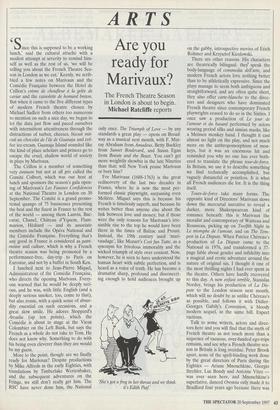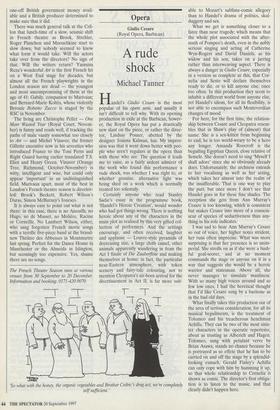ARTS
Are you ready for Marivaux?
The French Theatre Season in London is about to begin. Michael Ratcliffe reports
‘s
ince this is supposed to be a working lunch,' said the cultural attaché with a modest attempt at severity to remind him- self as well as the rest of us, 'we will be telling you about the French Theatre Sea- son in London as we eat.' Keenly, we scrib- bled a few notes on Marivaux and the Comedie Francaise between the Hotel de Crillon's creme de choufleur a la gelee de caviar and the cassolette de homard breton. But when it came to the five different types of modern French theatre chosen by Michael Sadleir from others too numerous to mention on such a nice day, we began to let the data just flow and paced ourselves with intermittent attentiveness through the distractions of turbot, cheeses, biscuit mit- cuit au chocolat de l'ile de Guanaja and cof- fee ice-cream. Guanaja Island sounded like the kind of place scholars and princes go to escape the cruel, shallow world of society in plays by Marivaux.
The Crillon is a member of something very eminent but not at all gris called the Comite Colbert, which was our host at lunch and sponsors the season's gala open- ing of Marivaux's Les Fausses Confidences at the National Theatre in London on 30 September. The Comite is a grand promo- tional quango of 75 businesses presenting the best and the finest in France to the rest of the world — among them Lanvin, Bac- carat, Chanel, Château d'Yquem, Flam- marion, Hediard — and its associate members include the Opera National and the Comedie Francaise. Everything that's any good in France is considered as patri- moine and culture, which is why a French theatre season was being promoted by a performance-free, day-trip to Paris on Eurostar, and not by a buffet in South Ken.
I lunched next to Jean-Pierre Miguel, Administrateur of the Comedic Francaise, who directs the opening Marivaux. Every- one warned that he would be deeply seri- ous, and he was, with little English (and a deeply serious smoker, too, come to that), but also ironic, with a quick sense of absur- dity essential on such occasions, and a great slow smile. He adores Stoppard's Arcadia (up ten points), which the Comedie is about to stage at the Vieux Colombier on the Left Bank, but says the French as a whole do not take to Tom. He does not know why. Something to do with his being even cleverer than they are would be my guess. More to the point, though: are we finally ready for Marivaux? Despite productions by Mike Alfreds in the early Eighties, with translations by Timberlake Wertenbaker, and the subsequent adventures on the Fringe, we still don't really get him. The RSC have never done him, the National only once. The Triumph of Love — by any standards a great play — opens on Broad- way as a musical next month, with F. Mur- ray Abraham from Amadeus, Betty Buckley from Sunset Boulevard, and Susan Egan from Beauty and the Beast. You can't get more weightily showbiz in the late Nineties than that; will New York praise Marivaux or bury him?
For Marivaux (1688-1763) is the great rediscovery of the last two decades in France, where he is now the most per- formed classic playwright, surpassing even Moliere. Miguel says this is because his French is timelessly superb, and because he writes better than anyone else about the link between love and money; but if those were the only reasons for Marivaux's irre- sistible rise to the top he would have been there in the times of Balzac and Proust. Instead, the 19th century used `mari- vaudage', like Mozart's Cosi fan Tutte, as a synonym for frivolous immorality and the wicked triumph of style over content. Now, however, he is seen to have understood the human heart with subtle perfection, and is heard as a voice of truth. He has become a dramatist sharp, profound and disconcert- ing enough to hold audiences brought up `She's got a frog in her throat and we think its Edith Piaf' on the gabby, introspective movies of Erich Rohmer and Krzysztof Kieslowski.
There are other reasons. His characters are theatrically bilingual: they speak the body-language of commedia dell'arte, and modern French actors love nothing better than to be athletically expressive. Since the plays manage to seem both ambiguous and straightforward, and are often quite short, they also offer carte-blanche to the direc- tors and designers who have dominated French theatre since contemporary French playwrights ceased to do so in the Sixties. I once saw a production of Le jour de l'amour et du hasard performed by actors wearing period silks and simian masks, like a Meissen monkey band. I thought it cast almost no light on the play, and not much more on the anthropomorphism of mon- keys, but it was an enormous hit and reminded you why no one has ever both- ered to translate the phrase tour-de-force. In Britain, we use it to describe something we find technically accomplished, but vaguely distasteful or pointless. It is what all French audiences die for. It is the thing itself.
Tours-de-force take many forms. The opposite kind of Directors' Marivaux slows down the mercurial narrative to reveal a darker, more Shakespearean kind of romance beneath: this is Marivaux the moralist and contemporary of Watteau and Rousseau, picking up on Twelfth Night in Le triomphe de l'amour, and on The Tem- pest in La Dispute. When Patrice Chereau's production of La Dispute came to the National in 1976, and transformed a 37- page fable about gender and infidelity into a magical and erotic adventure around the nature of original sin, I thought it one of the most thrilling nights I had ever spent in the theatre. Others have hardly recovered to this day. A new enfant terrible, Stanislas Nordey, brings his production of La Dis- pute to the London season next month, which will no doubt be as unlike Chereau's as possible, and follows it with Didier- Georges Gabily's Contention, a bloody modem sequel, in the same bill. Expect ructions.
Talk to some writers, actors and direc- tors here and you will find that the myth of French theatre as not much more than a sequence of vacuous, over-funded ego-trips remains, and see why a French theatre sea- son in Britain is long overdue. Peter Brook apart, none of the spell-binding work done by the great directors of Paris during the Eighties — Ariane Mnouchkine, Giorgio Strehler, Luc Bondy and Antoine Vitez was ever seen here, and Mnouchkine's superlative, danced Oresteia only made it to Bradford four years ago because there was one-off British government money avail- able and a British producer determined to make sure that it did.
There was much general talk at the Cril- lon that lunch-time of a slow, seismic shift in French theatre as Brook, Strehler, Roger Planchon and Mnouchkine start to slow down, but nobody seemed to know what form it would take. Will the actors take over from the directors? No sign of that. Will the writers return? Yasmina Reza's wonderful Art is the first French hit on a West End stage for decades, but almost all the French playwrights in the London season are dead — the youngest and most uncompromising of them at the age of 41: Gabily, companion to Marivaux; and Bernard-Marie Kohes, whose violently Byronic Roberto Zucco is staged by the RSC in November.
The living are Christophe Pellet — One More Wasted Year (Royal Court, Novem- ber) is funny and reads well, if tracking the paths of male vanity somewhat too closely to Art — and Michel Vinaver, the former Gillette executive now in his seventies who introduced France to the Toni Penn and Right Guard having earlier translated T.S. Eliot and Henry Green. Vinaver (Orange Tree, Richmond, October-November) is witty, intelligent and wise, but could only appear 'important' in an undistinguished field. Marivaux apart, most of the best in London's French theatre season is director- led: Brook's Beckett, Robert Wilson's Duras, Simon McBurney's Ionesco.
It is always easy to point out what is not there: in this case, there is no Anouilh, no Hugo, no de Musset, no Moliere, Racine or Corneille. No Lambert Wilson, either, who sang forgotten French movie songs with a terrific five-piece band at the brand- new Theatre des Abbesses in Montmartre last spring. Perfect for the Dance House in Manchester or the Almeida in Islington, but seemingly too expensive. Yes, shame there are no songs.
The French Theatre Season runs at various venues from 30 September to 20 December. Information and booking: 0171-420 0070.
`So what with the honey, the organic vegetables and Brother Cedric's drag act, we're completely self sufficient.'



































































 Previous page
Previous page